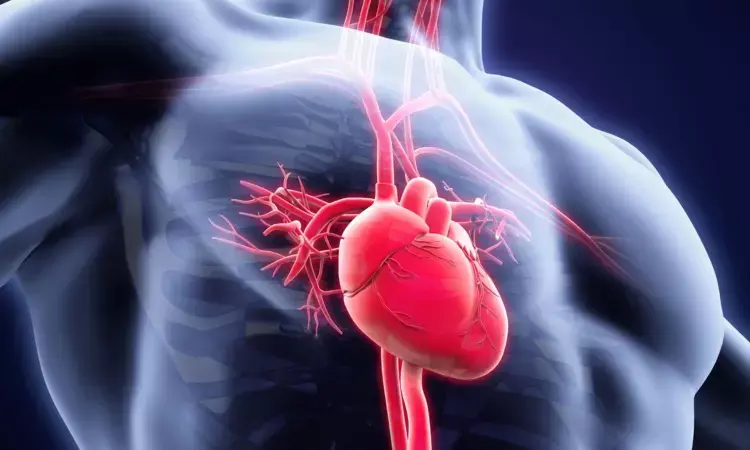- Home
- Medical news & Guidelines
- Anesthesiology
- Cardiology and CTVS
- Critical Care
- Dentistry
- Dermatology
- Diabetes and Endocrinology
- ENT
- Gastroenterology
- Medicine
- Nephrology
- Neurology
- Obstretics-Gynaecology
- Oncology
- Ophthalmology
- Orthopaedics
- Pediatrics-Neonatology
- Psychiatry
- Pulmonology
- Radiology
- Surgery
- Urology
- Laboratory Medicine
- Diet
- Nursing
- Paramedical
- Physiotherapy
- Health news
- Fact Check
- Bone Health Fact Check
- Brain Health Fact Check
- Cancer Related Fact Check
- Child Care Fact Check
- Dental and oral health fact check
- Diabetes and metabolic health fact check
- Diet and Nutrition Fact Check
- Eye and ENT Care Fact Check
- Fitness fact check
- Gut health fact check
- Heart health fact check
- Kidney health fact check
- Medical education fact check
- Men's health fact check
- Respiratory fact check
- Skin and hair care fact check
- Vaccine and Immunization fact check
- Women's health fact check
- AYUSH
- State News
- Andaman and Nicobar Islands
- Andhra Pradesh
- Arunachal Pradesh
- Assam
- Bihar
- Chandigarh
- Chattisgarh
- Dadra and Nagar Haveli
- Daman and Diu
- Delhi
- Goa
- Gujarat
- Haryana
- Himachal Pradesh
- Jammu & Kashmir
- Jharkhand
- Karnataka
- Kerala
- Ladakh
- Lakshadweep
- Madhya Pradesh
- Maharashtra
- Manipur
- Meghalaya
- Mizoram
- Nagaland
- Odisha
- Puducherry
- Punjab
- Rajasthan
- Sikkim
- Tamil Nadu
- Telangana
- Tripura
- Uttar Pradesh
- Uttrakhand
- West Bengal
- Medical Education
- Industry
PET Imaging Reveals Risk Factors for Major Adverse Cardiac Events in Cardiac Sarcoidosis: Study

Canada: A recent study published on August 7 in JACC: Cardiovascular Imaging finds that PET imaging can help determine if patients with cardiac sarcoidosis are at an increased risk of major adverse cardiac events (MACE).
In a meta-analysis of existing cardiac PET studies, researchers discovered that abnormal FDG uptake and perfusion defects were especially predictive of adverse outcomes.
"This study advocates for the routine use of FDG-PET in cardiac sarcoidosis for risk stratification, as patients exhibiting specific features like right ventricular uptake may be at an elevated risk for future MACE," Tahir S. Kafil, Department of Cardiovascular Medicine, Cleveland Clinic, Cleveland, Ohio, USA, and colleagues wrote.
Cardiac sarcoidosis, a condition characterized by granuloma formation in the heart, poses a substantial risk of serious complications, including heart failure, arrhythmias, and sudden cardiac death. Accurate risk stratification is crucial for managing these patients effectively. While positron emission tomography (PET) imaging is well-established for diagnosing cardiac sarcoidosis, its prognostic value and effectiveness in risk-stratifying patients for MACE are less understood.
To fill the knowledge gap, Nikolaos Tzemos, Western University, London, Ontario, Canada, and colleagues performed a systematic review and meta-analysis looking at the predictive value of PET imaging in patients with cardiac sarcoidosis.
For this purpose, the researchers reviewed current medical literature and aggregated data from 55 cardiac PET studies, which included 5,250 patients with cardiac sarcoidosis. These studies provided outcomes on various cardiovascular adverse events, such as death, arrhythmia, ventricular tachycardia, ventricular fibrillation, heart block, cardiomyopathy, and heart failure.
The search identified 3,010 records, of which 55 studies were selected for inclusion, representing 5,250 patients.
The following were the key findings:
- Factors associated with MACE included the following: the combination of abnormal fluorodeoxyglucose (FDG) uptake and perfusion defect, which had an OR of 2.86; abnormal perfusion or FDG uptake, which had an OR of 2.69; abnormal FDG uptake, which had an OR of 2.61; focal abnormal right ventricular uptake, which had an OR of 6.27; and a lack of response to immunosuppression on serial PET, which had an OR of 8.43.
- A QUIPS (Quality in Prognostic Studies) tool analysis found a low to moderate risk of bias, particularly given the small sample sizes in the individual studies.
In conclusion, the systematic review evaluated the predictive value of cardiac FDG PET imaging in CS. The risk of MACE was increased by factors such as a PET perfusion defect, increased FDG uptake, focal uptake in the right ventricle (RV), and a lack of therapeutic response observed in serial PET imaging.
"The studies exhibited a low to moderate risk of bias, particularly due to the small sample sizes. Despite the need for further research, PET imaging overall offers several valuable parameters for risk stratification," the researchers concluded.
Reference:
Kafil, T. S., Shaikh, O. M., Fanous, Y., Benjamen, J., Hashmi, M. M., Jawad, A., Dahrouj, T., Abazid, R. M., Swiha, M., Romsa, J., Beanlands, R. S., Ruddy, T. D., Mielniczuk, L., Birnie, D. H., & Tzemos, N. (2024). Risk Stratification in Cardiac Sarcoidosis With Cardiac Positron Emission Tomography: A Systematic Review and Meta-Analysis. JACC: Cardiovascular Imaging. https://doi.org/10.1016/j.jcmg.2024.05.013
Dr Kamal Kant Kohli-MBBS, DTCD- a chest specialist with more than 30 years of practice and a flair for writing clinical articles, Dr Kamal Kant Kohli joined Medical Dialogues as a Chief Editor of Medical News. Besides writing articles, as an editor, he proofreads and verifies all the medical content published on Medical Dialogues including those coming from journals, studies,medical conferences,guidelines etc. Email: drkohli@medicaldialogues.in. Contact no. 011-43720751


